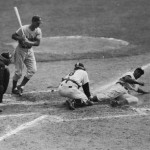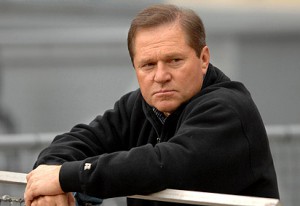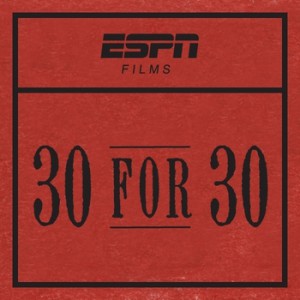(Editor’s Note: I first started writing this post in May of 2011, came back to it in August of 2012. Suddenly in Feb of 2013 this whole post got “scooped” by Craig Calcaterra on HardballTalk. Don’t you hate it when a post you’ve had in draft mode forever is essentially duplicated while you sit on it? At least it gave me some reason to finish it and finally publish it).
In early 2011, After watching a re-run of “Four Days in October” of the fantastic 30-for-30 series I got to thinking about the “leading” sports obsession, per city, around the country. There were numerous shots of the town of Boston, its fans, the bars, etc, and one clearly got the impression that Boston is a “Baseball town.” This got me thinking: what is the Leading Sport in every pro town in America?
(coincidentally, if you’re also a fan of the 30-for-30 series, I posted a review and ranking of all 30 original episodes in December 2010. ESPN’s 30 for 30 site also has a ranking page where, after you vote, you can see the results. I put in my own rankings on the Dec 2010 post, which I may re-publish at some point).
Here in Washington, clearly we are a Football town. The Redskins are king; every local sports radio show dedicates large portions of its programming to the Redskins in season or out, because that’s what draws. The other pro teams in town are of only passing interest to casual fans, are mostly followed by die-hards (like me and the Nationals of course), but if they have a run of success (as with the Capitals now and the Nationals in the first half of 2005 or in 2012) then suddenly they’re popular. But Football will always be king here. Some local sportswriters have mentioned the Jayson Werth walk-off in game 4 of last year’s NLDS as the moment that “Washington became a baseball town,” but I just don’t see it.
How about the other major sports towns in America? I took every town that has 2 or more pro franchises (since obviously, if you live in Jacksonville with only one major franchise, the answer is usually pretty clear) and put my thoughts down. Feel free to debate, criticize, or tell me I don’t know what i’m talking about. The towns are listed by category, in descending market size.
Four (or more) Sports towns
1. New York: Baseball. Despite having so many sports choices, I think the history and continued dominance of the Yankees makes NYC primarily a baseball town. That’s not to say that a city of 8 million people doesn’t support its football, basketball or hockey teams, but none of the other NY-based franchises have consistently been as good or in the news as much as the Yankees.
2. Los Angeles: Basketball. As with the Yankees of New York, the Lakers status as one of the marquee franchises (if not THE marquee franchise) of the NBA makes this a basketball town first and foremost. The Dodgers have 50+ years of history in the town, but the Lakers rule. Note; of all its major city counterparts, Los Angeles is also the closest to a “college town” that you’ll see. USC and UCLA both have major sports programs, the area hosts the Rose Bowl every year, and other lesser sports schools such as Loyola Marymount, Pepperdine, and Long Beach State all have had their moments in various college sports.
3. Chicago: Baseball (but open for debate). The Baseball history is obvious, with both teams having 100+ years of history and the Cubs being one of the marquee franchises in the sport. The Bulls clearly made the town a Basketball town for a sustained period of time, but I don’t get the impression they’ve supplanted the Cubs. The Blackhawks are an Original Six hockey team, and the Chicago Bears have been around since the beginning of organized professional football (In fact, they won the first NFL championship in 1933). So there’s a ton of sports history in this town. But do the other sports supplant the baseball culture?
4. Philadelphia: Football. The Phillies have re-made themselves into a dominant force in Baseball over the past few years (2012 notwithstanding), but nothing stokes the fire of Pennsylvanians as much as the E-A-G-L-E-S.
5. Dallas/Fort Worth: Football. Can’t get much more important to a town’s psyche than the Cowboys. Even if the Mavericks win a title and the Rangers make the World Series.
6. Miami: Football by attrition. The South Florida populace is so irritated with Jeffrey Loria that they’ll probably never be baseball diehards. The Heat? LeBron is johnny-come-lately. Hockey? In a town where it never gets below 60? Can’t see it. In fact, Miami may really be the most apathetic sports town out there. The rise of the U of Miami football team helped, but that fad has passed and Miami football barely draws any more. I don’t think you’d really say that the town is crazy over its Dolphins, but is it crazy about any of its teams?
7. Washington: Football. The Redskins rule (as discussed above), and the other teams are only of passing interest if they’re winning (which, in the Wizards case, hasn’t happened since the late 70s).
8. Detroit: Hockey. The Red Wings are an institution, and they don’t call Detroit “Hockey Town, USA” for nothing. The Tigers were a laughingstock for years, the Pistons had a slight run of glory under Isaiah Thomas, and the Lions are in the midst of a horrible period. Even with Detroit’s run of glory in the past decade, the Red Wings keep on rolling.
9. Boston: Baseball. The hold the Red Sox have on the psyche of New Englanders in general is legendary. Boston’s other teams have had sustained runs of greatness lately, and of course the Celtics rival the Lakers in terms of legendary franchises. But if you have to pick one team I still think its the Red Sox.
10. Atlanta: Football, I think. The Braves made the playoffs 15 straight years but the team couldn’t sell out its playoff games. I don’t think the town really cares about its hockey or basketball teams that much (in fact, the Hockey team moved to Winnipeg). How about the Falcons? Does the rise and fall of the Falcons drive sports talk in Atlanta? Perhaps the presence of Georgia Tech and SEC football makes the town more apathetic about its Pro teams.
11. Phoenix: Debatable as well. I’d guess Basketball as being the longest tenured professional team in Arizona. But, a number of teams now have spring training in Arizona and the Diamondbacks have a relatively recent World Series victory. The Arizona football team may have made a run to the 2009 Super Bowl but Arizona didn’t even have a football team for a number of years with the Rams relocation.
12. Minneapolis: Has to be Football. The Twins are contenders now but it wasn’t too long ago that the team was in supposed danger of contraction (thanks to their penny-pinching billionaire owner Jim Pohlad and his father). The basketball team is a punchline in the league. One of the few major northern/cold weather cities would be a natural for Hockey, but the North Stars left town and I had to look up the current pro hockey team’s franchise name. The Vikings current stadium is in dis-repair, and there’s rumors that the team may move from the area (perhaps to Los Angeles to continue a trend the Lakers started in 1960). There’s a voter backlash against paying for billion dollar properties that serve only to further enrich billionaire NFL owners, so the natural move for the Vikings may be to move out of town. Which is a shame for football diehards in the Twin Cities area.
13. Denver: Football. They only got baseball and hockey within the past 20 years, and i’m pretty sure the Nuggets don’t outweigh the successful Broncos.
Three Sport Towns
1. Houston: I’d say Football, if only because its Texas (where football rules) and because the baseball team has a history of underperforming. Houston is definitely a destination spot for NBA players (tax purposes, warm-weather city) but does it out-shine the Texans? Clearly it isn’t the Astros, who may lose 115 games this year.
2. Toronto: Hockey. One of the original 6 NHL franchises, a troubled basketball squad and the general dissatisfaction in Canada re: professional baseball since the strike.
3. Oakland: Football. Raider-nation is psychotic. The A’s lack of expenditure and outright politicking to move to San Jose has soured the community on baseball to the point where large swaths of the outfield are tarped over during regular season games. Golden State has reached the playoffs once in the past 18 years.
4. St. Louis: Baseball. Perhaps Football, with the run-and-gun Rams and the incredible noise they generate in their indoor stadium. But St. Louis has the 2nd most successful baseball franchise in the sport (in terms of World Series victories) and a continual line of success.
5. Pittsburgh: Football. No one can trump the Steelers, not even the owned-by-team-legend Penguins. In most other cities this would be a hockey town.
6. Tampa Bay: Football. Despite a recent run of success, the Rays barely draw (though have great TV ratings). The Lightning are a great team … but I can’t see such a warm weather city really dedicating itself to a cold-weather sport. So by default we have Football.
7. Cleveland: Football. The moving of the original Browns franchise was one of the true tragedies of sports relocation; a beloved team that was well supported picking up and moving. So controversial was the move that the city was allowed to keep its name and almost immediately an expansion team was “invented” to give back to the city.
8. Milwaukee: Football, if you count Green Bay as being in the Milwaukee Market. And I do, which may or may not be considered “correct” in the opinion of Wisconsin natives.
Two Sport Towns: these towns are either-or, and mostly football wins.
1. San Francisco: Football. Despite all the history with the Giants, going to 49ers games reinforces the notion that the Bay Area loves its football. This is the single city for which I disagree with Calcaterra, perhaps because I’ve seen 49er games and, well, they’re just as crazy as Raider fans.
2. Seattle: Football. Seahawks games are notorious for being amongst the loudest in the league despite an open-air stadium. The Mariners have some history of success, and a great following, but don’t out-weigh the Football team.
3. San Diego: Football again; the baseball team doesn’t really draw and this beautiful-weather city doesn’t like to commit to spending its sunny evenings at baseball games. Of course, it would help if their owner would open up his pocketbook once in a while.
4. Baltimore: Football. It was a travesty when the Colts left town, but the team has embraced its Ravens. The Orioles had their shot to take over the town during the no-football period, and it looked as if they just might. With one of the crown jewel stadiums in the league they shot to the top of the baseball world (for a time in the mid 90s it was Baltimore with the highest payroll in the league, not the Yankees). Unfortunately owner Angelos has run the team into the ground, and the changing baseball market forces now mean that Baltimore is destined to be a 2nd tier team for the extended future.
5. Cincinnati: Baseball. Both pro teams (Reds and Bengals) have respected histories and long line of success. And yet both teams have struggled as of late. The Reds have 3 World Series victories since 1940 but none since a shock win in 1990, and its been a long time since the Big Red Machine was in effect. But the Bengals have never won a superbowl and havn’t even reached it since 1988. By virtue of the Reds recent run of success I’ll go with Baseball.
6. Kansas City: Football all the way. The Royals may look dangerous this season, but they’ve lost an entire generation of fans to ineptitude. Meanwhile the Chiefs are an original AFL landmark and make Arrowhead one of the best home field advantages in the league.
7. Indianapolis: Arguable. Indiana is the heart of Basketball middle-america, the home of Hoosiers and major basketball pride in the high schools and colleges. So are the Pacers the leading sports interest? Not with the sustained success of the Colts football team, led by possible best-ever player Peyton Manning. But Manning is gone, and I think Basketball is still king.
8. Charlotte: none? Charlotte is home to the Panthers and to the Bobcats. Because of the college-basketball crazy state of North Carolina, one would think that Basketball would be king. But the new franchise has one playoff appearance in its history and seems to be going backwards under new owner Michael Jordan (at least in the opinion of basketball pundits and observers). The Old franchise was so abhorred due to owner’s George Shinn’s personal conduct that the community more or less boycotted the games, forcing their move to New Orleans. Meanwhile are the Panthers the hot name in town either? They’ve made one super bowl appearance but finished last year 2-14. I’m going with Basketball just by default.
9. New Orleans: Football! With an exclamation point; the “Who-Dat” Saints have always been the soul of this sports-town. 2010’s Super Bowl victory was just icing on the cake. The basketball team shouldn’t have been moved there to begin with, and struggled so badly that the league bought out Shinn’s interest in order to keep them (for whatever reason) in New Orleans. (Perhaps a move to Seattle is in the cards?)
10. Nashville: Football. The Predators are never going to out-live the pull of the Titans.
11. Buffalo: Tough one. I’d go Football if only because the city still holds on to its great run of super bowl appearances, except that the team is playing “home games” in Toronto every year. The hockey team has never won the league but has been a pretty strong lately, so I’m going with a Hockey town.
Summary by sport:
- Football: 20
- Baseball: 5
- Basketball: 4
- Hockey: 3
Thoughts? Feedback? Do you think I have some of these cities mid-pegged?


